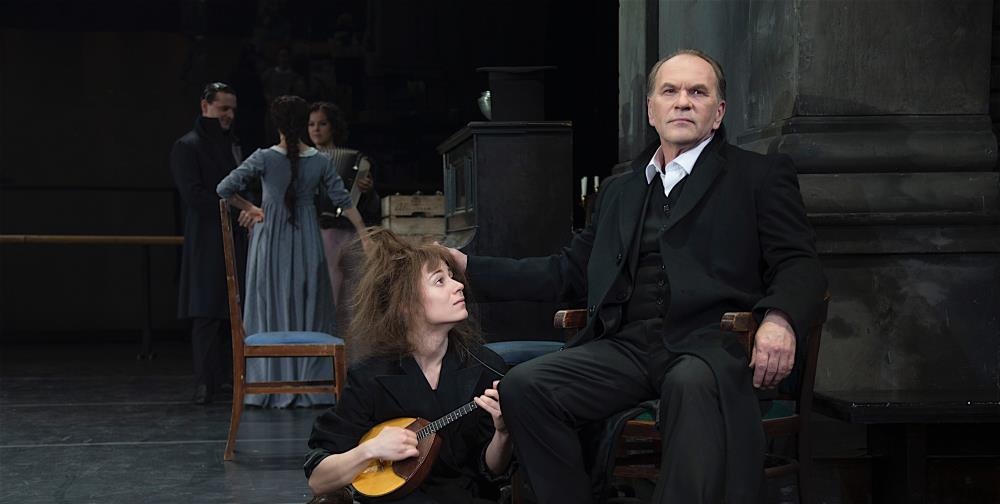

Alexander Pushkin is Russia’s national poet, and “Eugene Onegin” is his most resonant masterpiece. It is no easy feat to transfer the life of poetry to the stage, but it was the burden director Rimas Tuminas had to bear in his much-anticipated and much-acclaimed reimagination of Pushkin’s seminal poem. The production, shown in Amherst Cinema, lasts a little under two hundred minutes, and in that time presents a jarringly contorted vision of the world of “Onegin,” one in which regret mangles its chronology. The older Eugene Onegin reaches throughout for what could have been through the useless clarity of hindsight, but his efforts still end in vain. Tuminas’ “Eugene Onegin” is a meditation on remembrance, and, in many ways, radically departs from past incarnations of the timeless story.
But first, the synopsis. Both the poem and the play tell the story of Eugene Onegin, a jaded Petersburg dandy in imperial Russia. Onegin proxies the lethargic cynicism of his times when he casts his aspersions on the succession of parties and get-togethers in his way. He stands in stark contrast to friend and junior Vladimir Lensky, a young poet and capital-R Romantic in search of proportional love. As Lensky pursues a relationship with the sociable Olga Larina, disinterested Onegin tags along. But the poetry of “Eugene Onegin” curiously does not align with the flaring passions of Lensky. The ubiquitous rhyme scheme instead conspires with the tremendous feeling in its delightful rigidity, and at every turn the coldness of the poem’s form mirrors the coldness of Onegin’s heart. Only when Olga’s sister, the bookish, starry eyed Tatyana, enters the scene is their collaborative effort challenged, and as time passes, Onegin’s indifferent front painfully erodes away.
While familiarity with the poem would no doubt be of tremendous help in understanding the significance of Tuminas’s production, one cannot help but feel that this reimagining is in some ways a stand-alone work of art. This sensation is particularly due to the things the production excises. Certain omissions are inherent to the differences between stage and poetry. The rhyme scheme that so cleverly conceals and deceives disappears, leaving a Pushkin shaped hole that has no substitute. To its credit, the production uniquely operates from the vantage point of a wise and wounded Onegin looking back to his youth, and this mechanism provides a kind of distance that theoretically mirrors the coldness of Pushkin’s poesy. But in execution, the older Onegin is far too emotionally engaged. The act of remembrance, instead of dulling the effect of the unfolding tragedy, doubles it, and in its wake the audience finds two Onegins with whom to empathize.
Other changes in the story and presentation are incidental, such as the inclusion of a ballet troupe, a mute lady and a hyperactive rabbit. What these new characters do is not important. They are abstractions of the overarching emotions of the story, pocketed in the downtimes of drama simultaneously to maintain audience attention and to summarize the themes of the play thus far. These small additions run the gamut of quality: hilarious and entertaining at best, interminable and boring at worst.
Even though an overwrought gag or a tonally dissonant interlude causes the tone of the production to occasionally hiccup, the play remains admirably coherent throughout. Much of the play’s coherence is thanks to its actors, who bring the best of their passion and craft to their respective lots in the tale. The two Onegins allow only a single fault line to run down their implacable face-masks, but they channel so much suppressed emotion along that crack that it feels as though a meltdown is imminent at every significant turn of the plot. Tatyana’s transformation over the play’s 198 minutes is a mini drama of its own, skillfully pacing her progression from clumsy girl to hardened woman in tandem with the ebb and flow of Onegin’s heart. Whatever fault the production may possess, it does not lie in its casting.
There is an unmistakable sense that the last third of the production loses steam. Tatyana’s development finds a well-timed closure, but the existence of two Onegins is complicated. This feels like a necessary imperfection, particularly since the waning end of the original poem cloaked the lack of narrative with impressionism. In a way, it reveals how a reimagining this radical is still so chained to the state and stature of the original work. Perhaps, then, the best way to view the production is to situate it in the long history of retelling and rehearing, a history that only has all of the future to extend and expand.